Aug 8, 2019
Saputo beats expectations as Q1 profits drops despite higher revenues
The Canadian Press

MONTREAL -- Saputo Inc. (SAP.TO) has set its sights on the alternative protein market and is already negotiating with players from the sector to carve out a place for itself.
In response to a shareholder question at its annual meeting, chief executive Lino Saputo Jr. said the company "will never get out" of the dairy business, but added that it was considering entering the vegetable protein market.
He later told reporters that it wants to "follow the trends of our consumers."
"If consumers want to have beverages made from plants, we will find a way to enter this category," he said. "This can be through acquiring trademarks that are important to consumers or through partnerships with people who are already in the business and who do not have the capacity to manufacture.
"We are now negotiating with companies so we can do the processing for them and, in some cases, especially in Canada, do the distribution too," he added.
Saputo said there are "a lot of players in this field who have good brands, but they do not have the infrastructure for processing. We are specialists in transformation."
Earlier, Saputo posted results for the first quarter of its fiscal year that beat expectations.
The Montreal-based dairy processor earned $121.4 million or 31 cents per share for the three months ended June 30, down 3.7 per cent. The result includes an after-tax restructuring charge of $21.5 million.
Although profits have declined slightly, the results are very encouraging, the CEO said.
Over the past two years, the industry has been struggling with large dairy surpluses, particularly in Europe, the United States, Australia and New Zealand. However, in recent months, the situation has started to recover as some companies have left the industry and others have reduced their production while some jurisdictions have established parallel regulations to reduce production levels.
"The rebalancing in (milk) solids drove up prices that were reflected in our first-quarter results," said Saputo. "This is the first time in 24 months that we have seen an improvement in the overall dairy situation. "
Excluding non-recurring items, Saputo posted adjusted earnings of $164.9 million, or 42 cents per share, up 2.9 per cent from the second quarter last year.
Revenues were $3.67 billion, up 12.3 per cent. The acquisition of the British Dairy Crest completed last April added $152 million.
The company was expected to earn 38 cents per share in adjusted profits on $3.7 billion of revenues, according to financial markets data firm Refinitiv.
On the Toronto Stock Exchange, Saputo shares closed at $42.06, up $170 or 4.2 per cent in Thursday trading.


